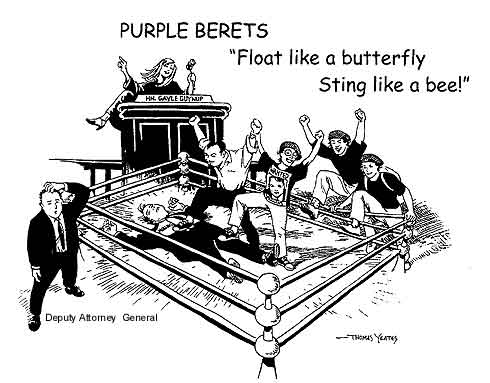
|
|
 |
Other Law Enforcement Issues |
|
|
|
|
|
|
|
"Now
every day they're dyin' in the county jail
Listen to ‘em people you can hear them wail. Beggin' for a medic, ‘stead they're treated with scorn While the guards are watchin' internet porn." |
|
From
"Bullshit!" Original song by Dakota Sid
Lyrics by Tanya Brannan & Annie Haught |
On Bastille Day,* 1998, four Purple Berets supporters took over the Sonoma County Board of Supervisors meeting, demanding that our elected officials act in the wake of the deaths of five county jail inmates in just nine months. This emergency action was sparked by the revelation that Sheriff Jim Piccinini had suppressed the California Board of Corrections report of their investigation into the inmate deaths. When finally released, the report showed serious misconduct, negligence and mishandling of medical and mental health care at the jail -- misconduct that no doubt contributed to the five deaths.
Our arrest that day for disrupting a public meeting and other misdemeanors called attention to the damning report and refocused public attention on the complicity and inaction of our public officials, both sheriff and supervisors, in the face of these needless deaths.
|
"Joanie
Holmes was the first to die a year ago
But the dyin' didn't stop until Carolyn Telzrow. Five lay dead. How many more to go ‘Til the Board of Supes will finally say no." |
|
From
"Bullshit!"
|
But there is another county official who escaped public notice, despite his direct responsibility for the sheriff being able to conduct business as usual, even as the bodies piled up at the jailhouse door. District Attorney Mike Mullins found no negligence or other criminal conduct in any of those five or any of the subsequent inmate deaths.
Make no mistake about it: it is the district attorney who sets the standard for the local criminal justice system. With his "unfettered discretion" to prosecute or not, he alone decides what will be considered a crime and what, with only a wink and a nod in the direction of the penal code, will be ignored. Far more powerful than the assembly representatives who make the laws or the cops sent out to enforce them, in the final analysis the district attorney is the law.
Our Motion
to Recuse
Exactly
one year after our arrest, the Purple Berets struck a mighty blow
against the awesome power of prosecutorial impunity. In court
hearings on the civil disobedience case against us, Judge Gayle
Guynup did what every judge in town would love to do: she ruled
against Mike Mullins.
Siding with us, Guynup granted our motion to recuse, thus removing Mullins and his entire office from our case. Her ruling reasoned that the D.A.'s prejudice against the Purple Berets made it "unlikely the defendants would receive a fair trial."
Guynup based her decision on the deft legal arguments of our lawyer, Sandy Feinland, and on nearly an hour of testimony. Our time on the stand was spent detailing eight years of Purple Beret actions exposing the district attorney, mostly targeting his handling of violence against women .
This is a stunning victory; you NEVER get to win recusal motions against prosecutors. As attorney Feinland put it, "In any criminal practice guide, in the section under recusing the district attorney's office, they basically tell you don't bother." We bothered. And we won! With the D.A. removed, the California Attorney General's office would take over the prosecution.
Editor's Note: Unfortunately, the case still wasn't over. D.A. Mullins then appealed Judge Guynup's recusal ruling, still wanting to get his chance at us in court. Unfortunately, appellate hearings on misdemeanor cases don't go up to an outside court, so the appellate panel was made up of three local judges: Arnie Rosenfeld, Robert Dale and Elaine Waters. (Originally Pat Gray was to be on the panel but she stepped down due to her own documented bias. [See Standing Together.]) Shockingly, Judge Guynup's ruling was overturned and our case was sent back to superior court with an even MORE biased Mike Mullins heading up the prosecution. Finally, the county's most expensive misdemeanor prosecution ever ended in December, 2000 when the Purple Beret defendants completed 25 hours of community service. (I know, I know -- we thought that was what we did when we got arrested!) (See Standing Together.)
* On July 14, 1789, Parisian revolutionaries stormed the Bastille (Paris's version of San Quentin), freeing the prisoners. Bastille Day has become a symbol of the triumph of popular insurrection over the arbitrary power of the state.
|
©
Tanya Brannan, Purple Berets
|
|
You
can copy and distribute this information at will
if you include credit and don't edit. |
|
|
|
Copyright
© 2001 Purple Berets
|
|
|
|
Web
Site by S.
Henry Wild
|
